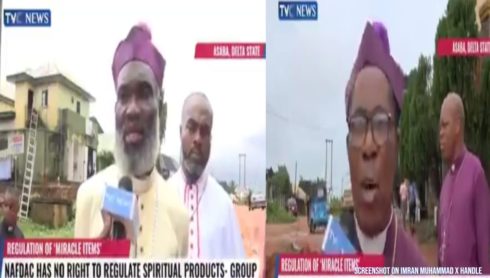A group of protesters assembled at the National Agency for Food and Drug Administration and Control (NAFDAC) office in Asaba to voice their opposition to what they described as unwarranted interference by the agency in religious matters. The protest is centered around NAFDAC’s alleged attempts to regulate spiritual products associated with Senior Prophet Jeremiah Fufeyin, leader of the Christ Mercyland Deliverance Ministry. According to the protesters, these products are spiritual in nature and fall outside the agency’s regulatory jurisdiction.
The demonstrators carried placards bearing messages that conveyed their dissatisfaction, citing violations of religious freedoms. The core of their argument is that NAFDAC’s mandate is to oversee food, drugs, and physical consumer products, and that spiritual practices and materials—such as those provided by Prophet Fufeyin—are beyond the agency’s remit. They accused the agency of infringing on the religious rights of the prophet and his congregation.
Prophet Fufeyin’s Spiritual Products Under Scrutiny, NAFDAC’s Alleged Overreach Sparks Controversy
At the heart of the issue are the spiritual products endorsed by Prophet Jeremiah Fufeyin, which reportedly include anointing oils and other faith-based items used by his followers. NAFDAC has allegedly sought to extend its regulatory control over these products, drawing widespread criticism from the prophet’s supporters. The protesters argue that such items are symbolic of spiritual healing and guidance, and thus should not be subject to the same oversight as pharmaceuticals or consumable goods.
The controversy has ignited a broader debate over the extent of NAFDAC’s powers and the agency’s perceived encroachment into religious affairs. Critics fear that allowing regulatory bodies to govern spiritual matters could lead to a dangerous precedent, potentially curbing the religious practices of Nigerians who rely on such products as part of their faith.
Protesters Urge NAFDAC to Respect Religious Freedom, Agency’s Actions Seen as Threat to Constitutional Rights
Demonstrators stressed the need for NAFDAC to honor Nigeria’s constitutional commitment to freedom of religion. They claimed that the agency’s actions violate Section 38 of the Nigerian Constitution, which guarantees citizens the right to freely practice their religion. According to the protesters, by attempting to regulate spiritual products, NAFDAC is crossing into sensitive religious territory and undermining the rights of Prophet Fufeyin and his followers.
Protesters called on the federal government to step in, expressing concern that the ongoing actions of NAFDAC could lead to more significant infringements on religious rights. Many fear that if left unchecked, this incident could open the door for further government involvement in religious practices, a scenario they argue must be avoided to preserve religious harmony in the country.
NAFDAC Yet to Respond to Protesters’ Demands, Agency’s Silence Fuels Speculation and Tension
NAFDAC has remained silent in the wake of the protests, further heightening tensions among the demonstrators and the wider public. The agency’s failure to issue an official statement or respond to the concerns raised has led to widespread speculation about its motives and potential future actions. Some believe NAFDAC’s silence suggests that the agency may be re-evaluating its stance, while others worry that it is simply ignoring the demands of the protesters.
This lack of communication has left many Nigerians questioning the true scope of NAFDAC’s authority. Meanwhile, protesters have vowed to continue their demonstration until they receive a clear response from the agency, as well as a firm commitment that spiritual products will not fall under regulatory scrutiny.
Protesters Vow to Continue Demonstration, Demanding Respect for Religious Rights
Undeterred by NAFDAC’s silence, the protesters have pledged to sustain their campaign until their demands are fully addressed. Chief among these demands is a public acknowledgment from NAFDAC that spiritual products are beyond its regulatory scope. They are also requesting an apology for what they perceive as an attack on their religious beliefs and practices.
As the demonstrations gain momentum, the protesters remain firm in their commitment to protect the religious freedom of Prophet Fufeyin and his congregation. They argue that the situation represents a broader issue of government encroachment on religious liberties, and they intend to continue raising awareness until they receive assurances that such infringements will not be tolerated in Nigeria.
Religious and Civil Rights Groups Weigh In, Growing Support for Protesters’ Cause
Several religious and civil rights groups have joined the chorus of voices criticizing NAFDAC’s alleged actions, expressing concern over the agency’s interference in spiritual affairs. Many of these groups have emphasized the need for clear demarcations between governmental regulatory roles and religious practices, fearing that a blurring of these lines could have far-reaching consequences for religious freedom in Nigeria.
Legal experts and religious leaders have also weighed in on the matter, calling for a balanced approach that respects the separation between church and state. Some have suggested that NAFDAC may need to revise its policies to avoid future confrontations over spiritual practices, while others have called for greater oversight to ensure that the agency does not overstep its boundaries in regulating faith-based products.
Table of Contents
Discover more from OGM News NG
Subscribe to get the latest posts sent to your email.














